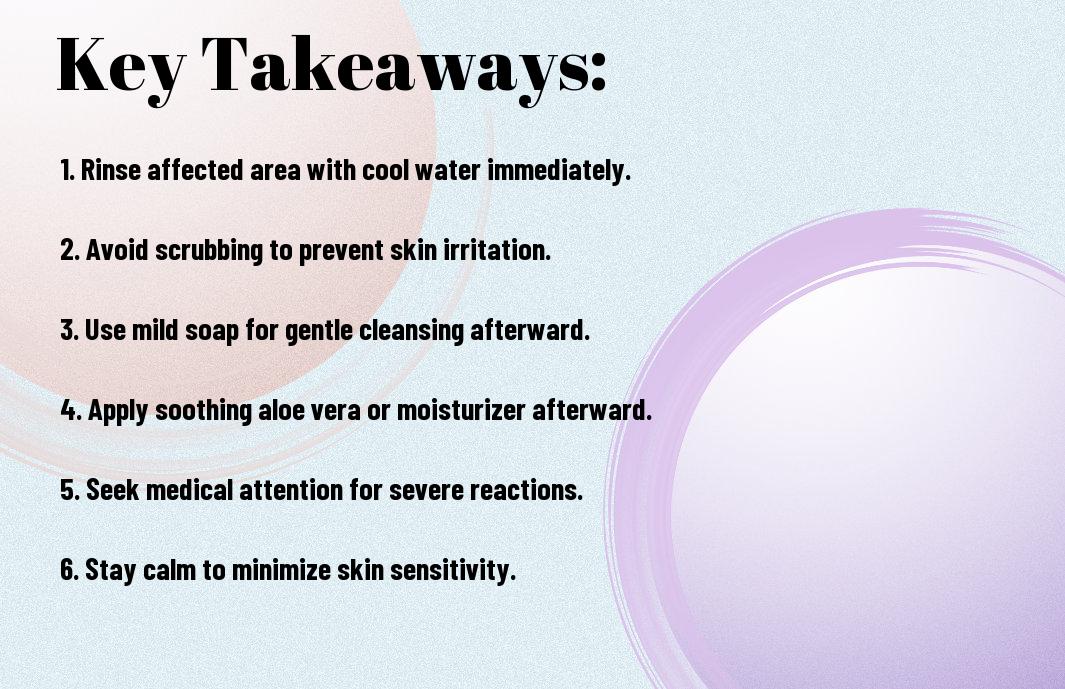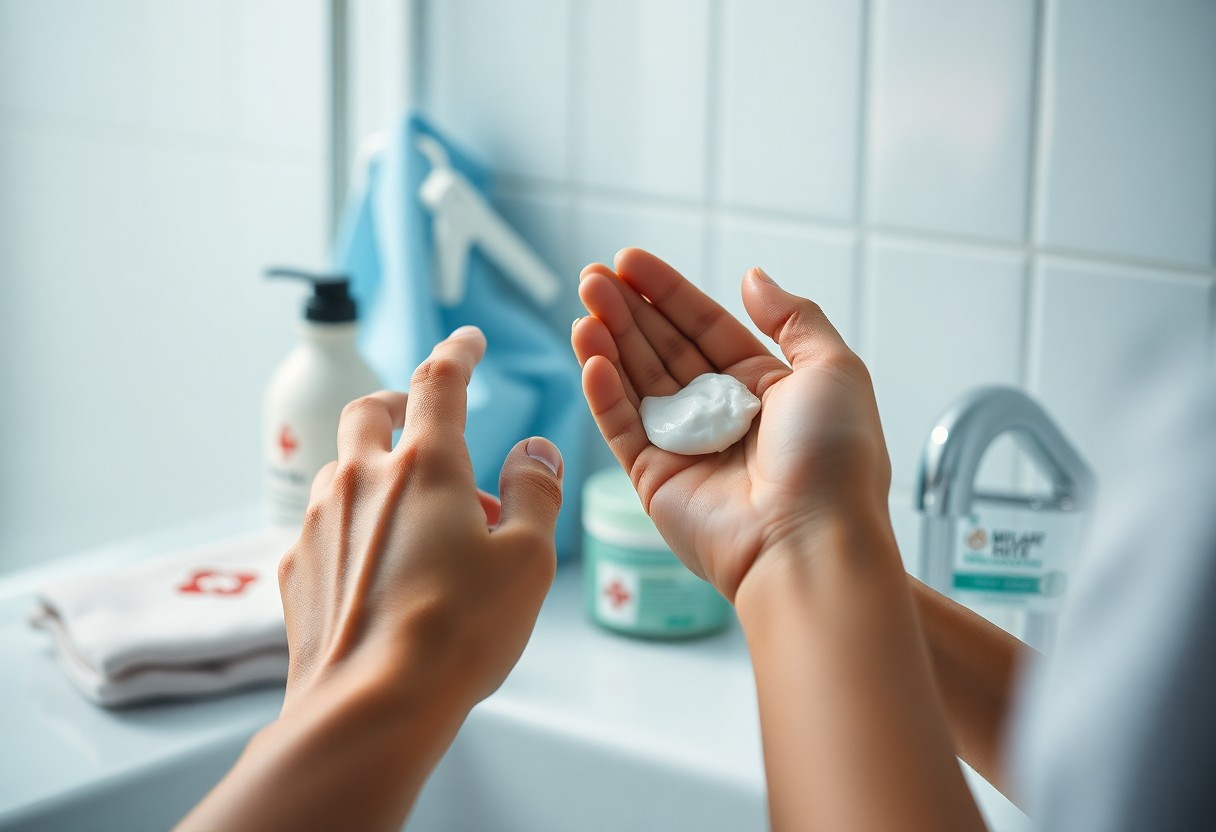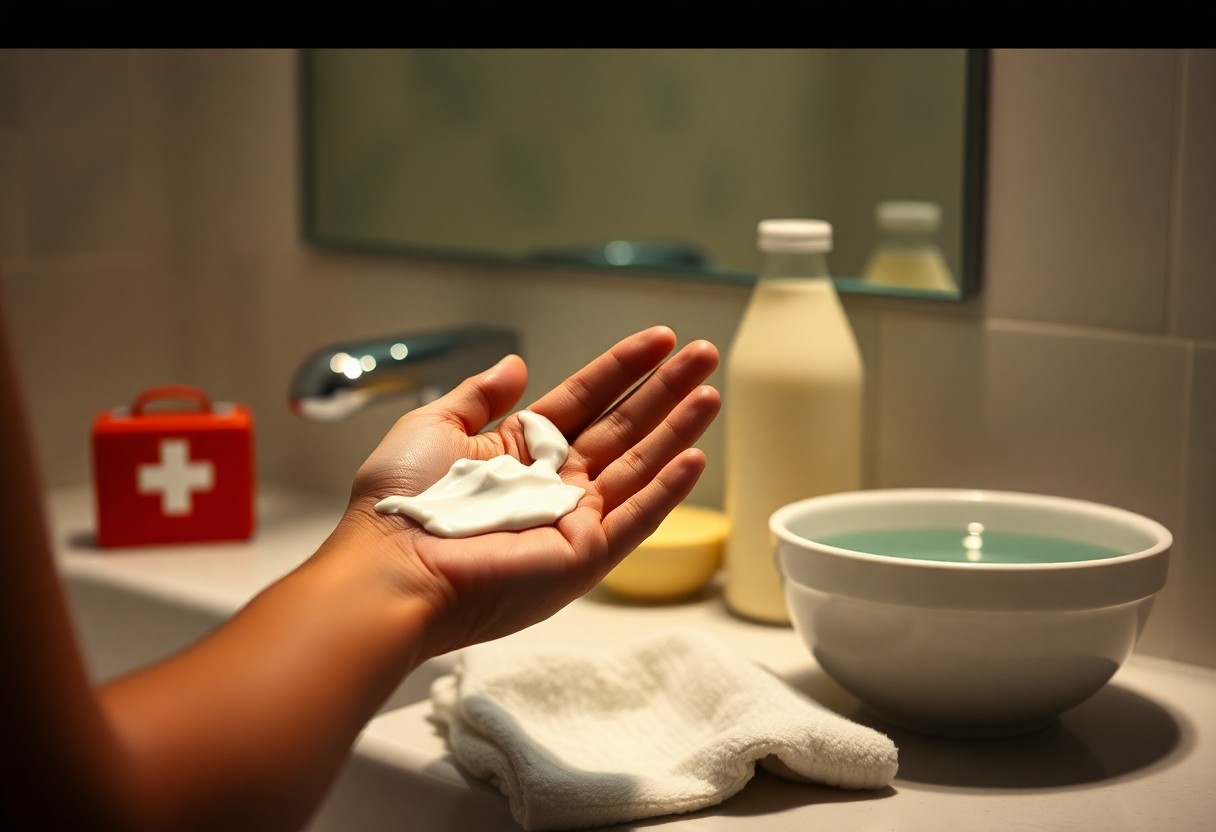How safeguard your skin after pepper spray exposure? It’s necessary to know how to protect your skin after an unfortunate encounter with pepper spray. The intense ingredients can cause significant discomfort, irritation, and even burns to your skin. Acting quickly can mitigate these effects, and taking the right steps is vital for your recovery. In this guide, you will learn practical first aid measures and skin care techniques to alleviate the burning sensation and promote healing after exposure. Your skin’s health is important, and taking necessary actions can help you restore it effectively.
Key Takeaways:
- Immediate Rinse: The first step is to rinse your skin with cool water as soon as possible to dilute the effects of the pepper spray.
- Avoid Touching: Do not touch your face or other sensitive areas to prevent further irritation.
- Remove Contaminated Clothing: Take off any clothing that may have come into contact with the pepper spray to minimize skin exposure.
- Use Specific Products: Look for products designed to neutralize pepper spray, such as specific wash solutions or commercial spray removers.
- Moisturize: After cleansing, apply a gentle moisturizer to soothe and hydrate your skin, reducing the risk of dryness or irritation.
- Consult a Professional: If irritation persists or worsens, seek medical advice from a healthcare professional.
- Avoid Heat: Stay away from hot showers or saunas, as heat can exacerbate discomfort and irritation on the skin.
Understanding Pepper Spray
To efficiently navigate the aftermath of a pepper spray incident, it’s vital to understand what it is. Pepper spray is a self-defense tool commonly used by law enforcement and civilians. It contains a potent mix of capsaicin, derived from hot peppers, and other chemicals that can induce temporary blindness, pain, and breathing difficulties. Recognizing these characteristics can help you manage your skin’s response and minimize lasting damage after exposure.
Composition and Effects on the Skin
Among the components of pepper spray, the active ingredient capsaicin can cause intense irritation to the skin. The oil-based formula can create a burning sensation, redness, and swelling. Numerous factors, such as concentration and individual skin sensitivity, can influence how your skin reacts. This makes it vital to treat any contact promptly and effectively to reduce discomfort and potential long-term effects.
Immediate Reactions to Pepper Spray
Below are the typical immediate reactions you may experience after contact with pepper spray: burning sensation, redness, and inflammation of the skin. Your eyes might water profusely, and you might feel a strong urge to itch. This initial response is your body’s defense mechanism reacting to the irritants in the spray.
Another key aspect of immediate reactions to pepper spray is the intense discomfort it causes. Your skin may feel as though it is on fire, leading to a strong urge to rub or scratch the affected area. However, this can aggravate the irritation and might cause further damage. The burning and stinging sensations can persist for various lengths of time, depending on your skin’s sensitivity and the concentration of the spray, making it vital to seek treatment quickly to alleviate these effects.

Immediate First Aid Measures
Any exposure to pepper spray can lead to intense pain and discomfort. To alleviate the harsh effects, take immediate action to mitigate the impact on your skin. This involves decontaminating the affected area swiftly and correctly to minimize potential damage and irritation.
Rinsing and Cleaning the Affected Area
The first step you should take is to rinse the affected skin with copious amounts of water. Use tepid water if available, as hot or ice-cold water may exacerbate the burning sensation. Gently lather the area with mild soap to help remove the chemical residue without further irritation.
Avoiding Common Mistakes
Against popular belief, using creams, oil, or lotions to soothe the burn can trap the pepper spray on your skin, making matters worse. Avoid touching your eyes or other sensitive areas unless you have properly cleaned your hands first to prevent spreading the irritant.
Hence, it’s imperative that you do not wash the affected skin with products containing alcohol or any other astringents, as they can intensify the irritation. Also, using rubbing alcohol is highly discouraged, as it will only serve to increase the pain. Always ensure that you keep your hands clean to avoid transferring the irritant to your eyes or other sensitive parts of your body. Instead, focus on thorough rinsing with water and soap to effectively wash away the pepper spray.

Long-term Skin Care Strategies
After experiencing exposure to pepper spray, developing a long-term skincare strategy is necessary. This involves consistently protecting, nourishing, and repairing your skin to ensure any damage is minimized. Regularly evaluate your skin’s condition and respond accordingly, prioritizing gentle cleansing and hydration to prevent further irritation. Incorporate products designed for sensitive skin and remain vigilant in your skincare routine to help restore your skin’s health over time.
Moisturizing After Exposure
By applying a rich moisturizer after exposure, you can help relieve dryness and restore your skin’s moisture barrier. Look for products with calming ingredients such as aloe vera or hyaluronic acid. This practice not only soothes the immediate discomfort but also promotes long-term hydration, ensuring your skin remains healthy and resilient.
Using Soothing Products
One effective approach to safeguard your skin involves using calming products specifically formulated for irritation. These soothing items can provide immediate relief from the burning sensation and redness caused by pepper spray exposure, making them invaluable in your skincare arsenal. Essential ingredients like chamomile, calendula, and salicylic acid can help to reduce inflammation while nourishing your skin. Always apply these products gently to avoid further aggravating your skin, prioritizing its recovery and overall health.
Care for your skin by selecting soothing products that not only relieve symptoms but also promote healing. Look for those with natural ingredients that are known to alleviate irritation, such as cucumber extract or oat-based formulations. Avoid harsh chemicals that could exacerbate your skin’s condition. Applying these products consistently will help minimize the discomfort and support long-term recovery, ensuring your skin returns to its natural balance while protecting it from future incidents.
When to Seek Professional Help
Many individuals may underestimate the effects of pepper spray on their skin, but if you experience persistent discomfort, significant swelling, or blistering, it’s imperative to seek medical advice. You can find more information and tips regarding skin care after exposure in this detailed [PSA] SKIN CARE FOR PROTESTERS – for pepper spray article.
Signs of Severe Reaction
Reaction to pepper spray varies, but severe signs include intense burning sensations, red welts, or any symptoms that worsen over time. If symptoms escalate despite your mitigation efforts, it’s time to consult a professional.
Consulting a Dermatologist
Signs of a severe reaction can lead you to consider consulting a dermatologist. If you notice any unusual changes to your skin, experiencing ongoing irritation, or develop a rash that doesn’t improve, a specialist can offer targeted treatment and advice.
Hence, acting promptly is vital in preventing longer-lasting damage to your skin. A dermatologist can conduct a thorough examination and provide appropriate medications or recommend specialized treatments tailored to your specific reaction. Their expertise is invaluable in addressing both the immediate and potential long-term consequences of pepper spray exposure, ensuring that your skin healing process is supported effectively.
Preventative Measures
Unlike other skin irritants, pepper spray can cause intense discomfort and irritation. To minimize your risk of exposure, it’s crucial to adopt preventative measures. This includes staying away from high-risk areas where pepper spray may be used, being aware of any gatherings or protests, and understanding how wind conditions can affect the spread of the spray. Taking these steps can help you protect your skin from unfortunate exposure.
Protective Gear and Precautions
To enhance your safety, consider wearing protective gear when you anticipate being in environments where pepper spray may be deployed. Items like goggles, face masks, and long clothing can act as barriers between your skin and the spray. Additionally, training yourself in self-defense techniques may further bolster your confidence and preparation for unexpected situations.
Awareness of Surroundings
Among various strategies to avoid pepper spray exposure, maintaining a keen awareness of your surroundings is vital. By staying alert to your environment, you’ll be more likely to recognizing potential threats and can take appropriate action to avoid them.
Another effective strategy is to observe the behavior of those around you. If you notice signs of escalating tension, such as shouting or aggressive movements, it may indicate potential use of pepper spray. Staying informed about local events and risk factors can further enhance your ability to promptly exit the area. Always keep an eye on nearby individuals and be prepared to move quickly if you feel danger is imminent. By remaining attuned to your environment, you can significantly reduce your chance of accidental exposure to pepper spray.

Myths and Facts About Pepper Spray
Despite its widespread use for self-defense, there are many misconceptions surrounding pepper spray that can lead to misinformed conclusions about its effects and safety. Understanding the differences between myths and facts can help you navigate potential dangers and protect your skin in the unfortunate event of contact.
Common Misconceptions
Around you, many may believe that pepper spray is harmless, or conversely, that it can cause lasting injuries. It’s important to distinguish between exaggerations and reality, as these views can influence how you react if you or someone else is exposed.
Evidence-based Information
Beside the myths, factual evidence shows that pepper spray primarily causes temporary irritation and discomfort, but in certain situations, it can lead to serious complications, especially if you have pre-existing respiratory conditions. It affects the eyes, skin, and respiratory systems, leading to intense burning sensations and potential swelling.
With approximate effects lasting from 30 minutes to several hours, those exposed may experience intense pain and redness. It’s important to know that direct contact with skin can lead to lasting irritation and potential chemical burns if not treated correctly. Always seek to flush the affected area with water and use soothing agents as needed. Understanding these facts can significantly impact your response and recovery process.
Final Words
Ultimately, safeguarding your skin after unfortunate contact with pepper spray involves swift and careful action. Start by rinsing the affected area with cool water and a mild soap to remove the irritant. Avoid using products that can exacerbate the reaction, like alcohol-based solutions. Keep your skin hydrated and avoid scratching to minimize irritation. If symptoms persist or worsen, seek medical attention. By taking these steps, you can ensure a more comfortable recovery process and protect your skin’s health.
FAQ
Q: What immediate actions should I take after being sprayed with pepper spray?
A: Immediately after exposure to pepper spray, you should move to a well-ventilated area to avoid inhaling more of the spray. Rinse your face and affected skin with cool, running water for at least 10-15 minutes. Avoid using hot water, as it can aggravate the skin irritation. Make sure not to rub your skin, as this can spread the irritant.
Q: Can I use soap or shampoo to wash off pepper spray?
A: It’s not advisable to use soap or shampoo immediately after contact with pepper spray, as these products can exacerbate the irritation. Instead, rinse your skin thoroughly with water first. After the initial rinse, you may gently wash the affected areas with mild soap and water to help remove any residue.
Q: What should I do if my eyes are affected by pepper spray?
A: If your eyes come into contact with pepper spray, it’s vital to flush them immediately with water or saline solution. You can do this by using an eye wash station, if available, or by leaning over a sink and letting a steady stream of water pour into your eyes, from the inner corner to the outer corner. Continue flushing for at least 15-20 minutes and avoid rubbing your eyes.
Q: Are there any home remedies that can help soothe the skin after pepper spray exposure?
A: Yes, several home remedies can help alleviate discomfort after exposure. Applying a cool compress to affected areas can soothe the burning sensation. You can also consider using aloe vera gel, as it has soothing properties. Other options include diluted vinegar or baking soda paste, which can help neutralize the irritation. Always do a patch test on a small area to check for sensitivity.
Q: When should I seek medical attention after exposure to pepper spray?
A: You should seek medical attention if you experience severe pain, difficulty breathing, extensive swelling, or vision problems that do not improve after rinsing. If symptoms persist or worsen, it is important to see a healthcare professional to rule out any serious reactions or complications.
Q: How can I prevent future exposure to pepper spray?
A: To prevent future exposure to pepper spray, be aware of your surroundings and avoid situations that could escalate into violence. Participating in self-defense classes can also help you develop strategies for avoiding confrontations. If you are in a setting where pepper spray may be used, ensure you maintain a safe distance from individuals who may use it.
Q: What long-term skin care measures can I take after an incident with pepper spray?
A: After the initial treatment, focus on keeping your skin moisturized to promote healing. Use products with soothing ingredients, such as hyaluronic acid or vitamin E, to support the recovery of your skin barrier. Additionally, applying sunscreen to protect sensitive areas from UV damage is important, as the skin may be more vulnerable after irritation from pepper spray.
